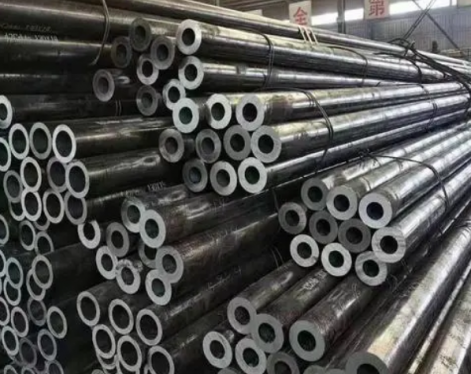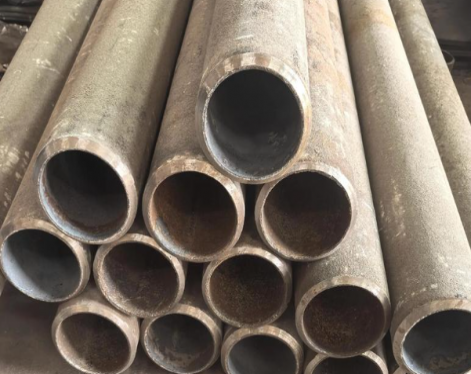Depending on the boiler working environment and requirements, boiler tubes made of different materials have their own advantages and disadvantages. It is recommended to choose materials that can meet the usage requirements, such as carbon steel, alloy steel, stainless steel, etc. These materials have high temperature, high pressure, corrosion resistance, and thermal conductivity. It has good characteristics and is a commonly used pipe material for boilers.
Characteristics of different boiler tube materials:
1. Carbon steel boiler tube
Carbon steel boiler tubes are a traditional boiler tube material and are widely used. Carbon steel has good processability and weldability and is widely used in medium and low pressure boilers. However, it is easy to rust in high temperature and high pressure environments and has a short service life.

2. Alloy steel boiler tubes
Alloy steel boiler tubes include Cr-Mo alloy steel, Cr-W alloy steel, Cr-Mo-V alloy steel, etc. Alloy steel has high oxidation resistance, corrosion resistance and heat resistance, and is more suitable for use in high-pressure and high-temperature boilers, but the price is higher.
3. Stainless steel boiler tubes
Stainless steel boiler tubes are widely used in high temperature, high pressure, and harsh environments due to their excellent oxidation resistance, corrosion resistance, and heat resistance. However, the price of stainless steel is also relatively high.
When choosing the right pipe material for your boiler, you need to consider the following factors:
1. Pressure resistance: Boilers usually withstand high temperatures and high pressures, so the selected pipeline materials must have sufficient pressure resistance to ensure the safety of the pipelines.
2. Corrosion resistance: The operating environment of boilers is usually harsh. If the selected pipeline material cannot resist corrosion inside the boiler well, the service life and safety of the pipeline will be affected.
3. Thermal conductivity: The essence of a boiler is to convert the heat energy generated by fuel combustion into water vapor. If the selected pipe material has poor thermal conductivity, it will affect the transmission efficiency of heat energy.
Selection of high, medium and low pressure boiler tubes:
1. Product structure: High, medium and low pressure boiler tubes are mainly composed of three parts: tube head, tube body and tube tail. The pipe head refers to the port of the boiler tube, which is usually made by forging or casting technology and is connected to components such as the drum or header; the tube body is the main part of the boiler tube, usually made of seamless steel pipes, with various internal Pressure component; the tube tail is the other end of the boiler tube, which is generally connected to the tube body and can also be made by forging or casting.
2. How to choose products: When selecting high, medium and low pressure boiler tubes, you need to consider the following factors: first, the diameter and length of the boiler tube, which should be determined according to actual needs; second, the wall thickness of the boiler tube, which should be determined according to the working pressure; Thirdly, the quality of the boiler tubes, products that have passed strict inspections should be selected; finally, the material of the boiler tubes is generally made of carbon steel or low alloy steel.
3. Product advantages: High, medium and low pressure boiler tubes have the following advantages: good mechanical properties, corrosion resistance, high temperature and high pressure resistance, fatigue resistance, high reliability, long life, easy installation, etc.
4. Usage scenarios: High, medium and low pressure boiler tubes are mainly used in various steam boilers, hot water boilers, organic heat carrier boilers and other boiler equipment. They are used as pressure components and are subjected to high temperature and high pressure working environments. Therefore, choose the appropriate boiler tube. It is the key to ensure the safe and reliable operation of boiler equipment.
Boiler tube maintenance:
In addition to selecting pipe materials suitable for the boiler, regular maintenance and inspection of the pipes are also required. Specific maintenance measures are as follows:
1. Regular cleaning: With the long-term use of the boiler, dirt and garbage are easy to accumulate inside the pipes, which not only affects the smoothness of the pipes, but may also cause pipe corrosion. Therefore, pipes need to be cleaned regularly.
2. Regular inspection: Regularly check whether the pipe connections and supports are loose and whether the locking nuts are tightened to ensure the stability and safety of the pipe.
3. Use appropriate seals: Appropriate seals can ensure the sealing performance of the pipeline and reduce the risk of air leakage and water leakage.
Summarize:
It is very important to choose pipe materials suitable for boilers. Commonly used materials include carbon steel seamless pipes, alloy pipes, stainless steel pipes, etc. In addition, regular maintenance and inspection of pipelines is required to ensure the safe and efficient operation of the boiler.
Characteristics of different boiler tube materials:
1. Carbon steel boiler tube
Carbon steel boiler tubes are a traditional boiler tube material and are widely used. Carbon steel has good processability and weldability and is widely used in medium and low pressure boilers. However, it is easy to rust in high temperature and high pressure environments and has a short service life.

2. Alloy steel boiler tubes
Alloy steel boiler tubes include Cr-Mo alloy steel, Cr-W alloy steel, Cr-Mo-V alloy steel, etc. Alloy steel has high oxidation resistance, corrosion resistance and heat resistance, and is more suitable for use in high-pressure and high-temperature boilers, but the price is higher.
3. Stainless steel boiler tubes
Stainless steel boiler tubes are widely used in high temperature, high pressure, and harsh environments due to their excellent oxidation resistance, corrosion resistance, and heat resistance. However, the price of stainless steel is also relatively high.
When choosing the right pipe material for your boiler, you need to consider the following factors:
1. Pressure resistance: Boilers usually withstand high temperatures and high pressures, so the selected pipeline materials must have sufficient pressure resistance to ensure the safety of the pipelines.
2. Corrosion resistance: The operating environment of boilers is usually harsh. If the selected pipeline material cannot resist corrosion inside the boiler well, the service life and safety of the pipeline will be affected.
3. Thermal conductivity: The essence of a boiler is to convert the heat energy generated by fuel combustion into water vapor. If the selected pipe material has poor thermal conductivity, it will affect the transmission efficiency of heat energy.
Selection of high, medium and low pressure boiler tubes:
1. Product structure: High, medium and low pressure boiler tubes are mainly composed of three parts: tube head, tube body and tube tail. The pipe head refers to the port of the boiler tube, which is usually made by forging or casting technology and is connected to components such as the drum or header; the tube body is the main part of the boiler tube, usually made of seamless steel pipes, with various internal Pressure component; the tube tail is the other end of the boiler tube, which is generally connected to the tube body and can also be made by forging or casting.
2. How to choose products: When selecting high, medium and low pressure boiler tubes, you need to consider the following factors: first, the diameter and length of the boiler tube, which should be determined according to actual needs; second, the wall thickness of the boiler tube, which should be determined according to the working pressure; Thirdly, the quality of the boiler tubes, products that have passed strict inspections should be selected; finally, the material of the boiler tubes is generally made of carbon steel or low alloy steel.
3. Product advantages: High, medium and low pressure boiler tubes have the following advantages: good mechanical properties, corrosion resistance, high temperature and high pressure resistance, fatigue resistance, high reliability, long life, easy installation, etc.
4. Usage scenarios: High, medium and low pressure boiler tubes are mainly used in various steam boilers, hot water boilers, organic heat carrier boilers and other boiler equipment. They are used as pressure components and are subjected to high temperature and high pressure working environments. Therefore, choose the appropriate boiler tube. It is the key to ensure the safe and reliable operation of boiler equipment.
Boiler tube maintenance:
In addition to selecting pipe materials suitable for the boiler, regular maintenance and inspection of the pipes are also required. Specific maintenance measures are as follows:
1. Regular cleaning: With the long-term use of the boiler, dirt and garbage are easy to accumulate inside the pipes, which not only affects the smoothness of the pipes, but may also cause pipe corrosion. Therefore, pipes need to be cleaned regularly.
2. Regular inspection: Regularly check whether the pipe connections and supports are loose and whether the locking nuts are tightened to ensure the stability and safety of the pipe.
3. Use appropriate seals: Appropriate seals can ensure the sealing performance of the pipeline and reduce the risk of air leakage and water leakage.
Summarize:
It is very important to choose pipe materials suitable for boilers. Commonly used materials include carbon steel seamless pipes, alloy pipes, stainless steel pipes, etc. In addition, regular maintenance and inspection of pipelines is required to ensure the safe and efficient operation of the boiler.









